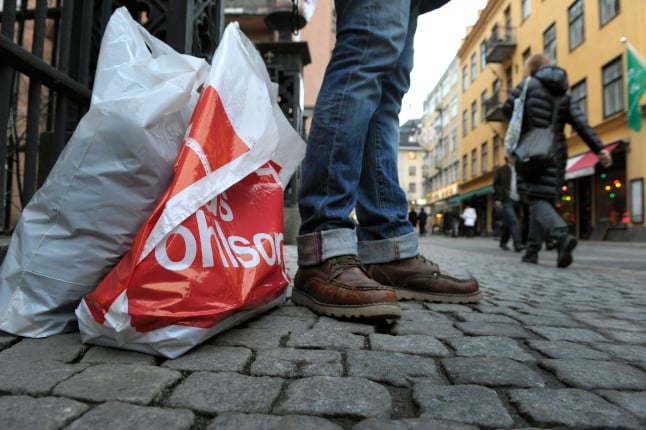Sweden introduces new plastic bag tax
A law change introducing a new tax on plastic carrier bags came into force on March 1st. This is meant to reduce rubbish in nature and in the sea, according to an EU directive from 2015 which states that member states are expected to reduce plastic bag usage to 40 per person and year by 2025.
However, you won't notice much changing straight away, because the tax won't apply until after May 1st, in order to give Swedish tax authorities time to adjust. Eventually, it will be three kronor for standard plastic bags and 30 öre for smaller fruit and vegetable bags.
It will be the manufacturers who pay the tax on the bags, but the Swedish Trade Federation (Svensk Handel) warns that the price will ultimately be passed on to consumers by shops. It estimated that the price for a plastic bag will rise to six or seven kronor. Read more about the new tax in The Local's article.

Photo: Janerik Henriksson/TT
Driving to Denmark gets cheaper
But only if you're paying the toll fee for the Öresund Bridge between Sweden and Denmark in Swedish kronor. The reason is a price adjustment from March 1st as a result of currency fluctuations, and is meant to ensure that Danish and Swedish drivers are paying approximately the same amount of money for a ticket.
As an example, a one-way ticket bought at the toll station now costs 555 kronor ($59.34, or 390 Danish kroner) instead of 565 kronor. And a bropass ticket for frequent travellers just got five kronor cheaper.

Thousands of people use the Öresund Bridge between Sweden and Denmark every day. Photo: Johan Nilsson/TT
Turn your clocks forward for summer time
Sweden will turn its clocks one hour forward at 2am on March 29th, but it could be the last time this happens.
The European Parliament last year voted to end the traditional changing of the clocks in spring and autumn from 2021, as The Local reported at the time. However, it is up to the European Council, made up of the leaders of member states, to have the final say and it has not yet made a decision. The Swedish government has said it is not against ending the practice if there is broad support in the country or parliament.
In a Europe-wide survey in 2018 some 80 percent of Europeans voted in favour of stopping the clock changes, with most people appearing to prefer to stay on summer time rather than winter time. A separate survey in Sweden suggested that two thirds of Swedes would be up for ditching the seasonal time changes.

Photo: Torstein Bøe/NTB scanpix/TT
Stockholm's new golden bridge arrives
A new bridge, nicknamed the golden bridge (or guldbron in Swedish) due to its golden colour, is set to be installed in central Stockholm, linking the Södermalm island to the capital's Old Town, Gamla Stan.
The ongoing and major construction work in the area, which includes a new bus terminal and improved ways of regulating water levels in the capital, is expected to finish in 2025 to the tune of 12.1 billion kronor.
The new bridge is 140 metres long and weighs around 3,400 tonnes. At the time of writing it is just entering the Öresund Strait between Sweden and Denmark, a month late, and is expected to reach the Stockholm archipelago on March 10th or 11th, and the city centre a day later. You can follow its progress here.

Artist's impression of the new Slussen bridge. Photo: Projekt Slussen/DBOX
What about the coronavirus?
As more and more countries are putting restrictive measures into place – such as telling people to stay at home from work if they have been to a risk area, or banning large audiences at events – to halt the spread of the coronavirus, which has infected more than 100,000 people globally, what is Sweden doing?
So far, the most effective measure in Sweden according to authorities is still to keep living your lives as normal, unless you experience symptoms in which case you should stay at home and call the national healthline 1177. More than 200 people have so far contracted the virus in Sweden, but it is not believed to have spread within the country – those who got it got it either abroad or via close contact with a patient.
But those guidelines could of course change as the situation develops. Keep up-to-date with Sweden's latest coronavirus news here, and all The Local's articles about the virus here.


 Please whitelist us to continue reading.
Please whitelist us to continue reading.
Member comments